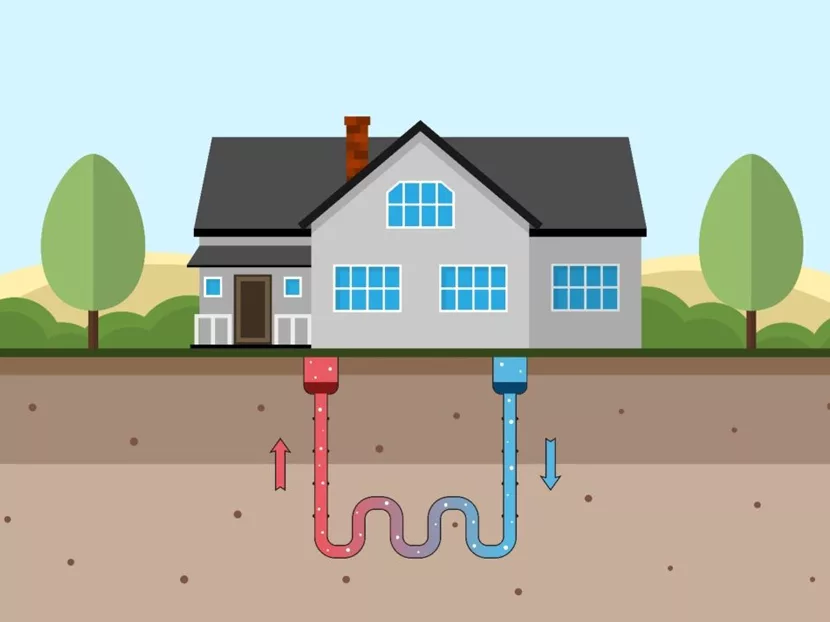According to many HVAC industry sources, a geothermal heat pump (GHP) is the best light commercial or home heating and cooling system you can choose. Just consult the good folks at ENERGY STAR, who certify home appliances and equipment as environmentally friendly, or even Comfort Aire Heating & Cooling's partners at Rheem, who manufacture industry-leading HVAC equipment. Everyone has great things to say about GHPs.
However, geothermal heating and cooling solutions may not be right for every home.
While geothermal heat pumps are incredibly efficient and able to save users considerable money over time, installation may not be feasible depending on the budget, the home’s physical location, and other factors.
Today we’re taking a closer look at how geothermal heating and cooling works versus conventional HVAC systems with air source heat pumps, as well as why the answer to whether GHPs are worth the investment is, “it depends.” There are a lot of great reasons to install geothermal equipment to heat and cool a home—including low cost or even free hot water as a byproduct of operation—but it simply may not make sense financially or based on certain facts about each unique home.
How Does a Geothermal Heat Pump Work?
While details of how GHPs heat and cool are somewhat complicated and technical, the “plain English” answer to how they work is that they utilize the earth below or around a home—and the near-constant temperatures found there—as the heat exchange medium. GHPs are sometimes referred to as ground source heat pumps (GSHPs) for this reason.
Alternatively, conventional air source heat pumps must use the air outside a home’s walls, which can vary wildly in temperature depending on the season and even time of day. And because the air temperature varies, air-source heat pumps must use electricity to produce appropriately hot or cold air to keep indoor spaces comfortable. GHPs mainly only need to use electricity to move already warmed or cooled air.
The way that GHPs access the temperate climate underground to harness it for home comfort is through geothermal loop systems. There are both closed and open loop systems that require underground piping to be installed and/or given access to an adequate body of water for proper heat exchange.
Closed loop systems in vertical, horizontal, or pond/lake configurations are most common for residential applications—the first two types utilize what’s known as Direct Exchange (DX) technology, which doesn’t require the use of water sources.
Advantages of Using a Geothermal System
So, why choose a GHP for a home or business? These are the three biggest pros.
1. Energy Savings
Whether one is concerned about reducing environmental impact or just about keeping an electric bill in check, geothermal heat pumps vastly outperform conventional equipment. Energy usage may be cut by up to 50 percent in both the heating and cooling seasons with a GHP!
2. Low Maintenance Equipment
While preventative maintenance is essential for all HVAC equipment, GHPs have fewer moving parts than traditional heat pumps. Additionally, once the ground loops are installed, they typically require no maintenance whatsoever.
3. Long Lifespan
Geothermal equipment has excellent longevity, with underground piping often warrantied for up to 50 years. The heat pumps themselves are usually guaranteed to last about 20 years. Compare that to the average lifespan of 15 years for a typical home air conditioning unit or heat pump, when properly maintained.
Geothermal System Disadvantages
With long-lasting equipment that’s easier on the environment and money-saving in operation, what’s not to love about geothermal systems? Unfortunately, there are some significant drawbacks, mainly related to their high initial cost of installation, as well as their demands on the land around the home or commercial building.
1. Steep Upfront Costs
There are sometimes green energy incentives available from federal, state, and local government entities, as well as some power providers that can help reduce the cost of geothermal system installation. Even with these programs, one may be looking at a price tag of about $10,000 to $20,000 to install a geothermal HVAC solution, which includes putting in the underground loops. And it may take up to 10 years to recoup that initial financial outlay before the system pays for itself.
This blog originally appeared on www.comfortaireheatingandcooling.com. Follow this link to continue reading.





